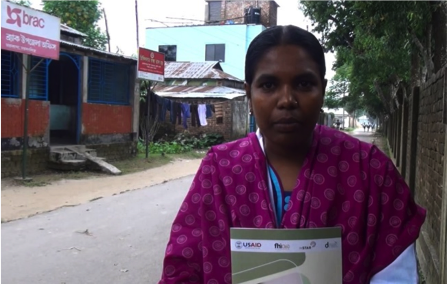By: Kazi Amit Imran
Often community health workers (CHWs) are promised incentives for their work, but the complicated, protracted, and at times, insecure process of disbursing funds is demotivating. USAID’s Mobile Alliance for Maternal Action (MAMA) project, with the help of USAID’s mSTAR project implemented by FHI 360, pilot tested a transition from cash to mobile financial services. This reduced the lag time between earning incentives and receiving payment, avoided long treks to the post office, and increased safety by eliminating the need to personally collect and carry cash. The success of the pilot not only increased CHW satisfaction, it also reduced cost and staff time.
Farida Yeasmin is a frontline CHW with BRAC, a partner organization of USAID’s MAMA project, locally known as the Aponjon program and implemented by Dnet. Farida has been working in the Mymemsingh district in Bangladesh’s central region for over a year. She was trained by BRAC on maternal, neonatal and child healthcare (MNCH) and primary healthcare to provide appropriate guidance to the families she visits.
The MAMA project is working to reduce maternal and child mortality by increasing community accessibility to information on maternal and children healthcare. Farida’s role is to register expectant and new mothers and their families to MAMA’s services. Once community members become subscribers, they benefit from receiving maternal and neonatal healthcare messages via SMS, obtaining guidance from doctors via a dedicated call center, and accessing referrals.
Farida receives BDT 10 to 20 (equivalent to USD 0.13 to 0.26) as an incentive for each new subscriber she registers. Incentives used to be paid in cash and took 41 calendar days for processing. It was a costly system involving 32 person hours. According to Farida, the process was cumbersome; she had to wait a long time to receive her payments. Once ready for collection, Farida had to travel three kilometers to the Upazilla (sub-district) office to collect her money. This was even more of a hassle when the weather was bad. In some cases, the money she received was different than what she had calculated on her own since the CHW and finance office were using different time frames given the long processing delay. Collecting the incentive from the office also meant that Farida had to defer her field visits for that day—losing the potential to earn new incentives—and she had to carry cash on her way back, which put her at risk of theft. This was the case for all of the more than 1,200 community health agents of the MAMA program.
Dnet felt that their disbursement process could be improved, but was unsure of what exactly to do. This all changed in late 2013 when Dnet received an mSTAR grant and was assisted to transition from cash to mobile payments. Dnet began adopting mobile payments using bKash and DBBL mobile banking into project operations to test whether they could enhance the efficiency of disbursements. Since all of their community health agents had access to a mobile phone, mobile payments presented a great opportunity in a country where only 40 percent of the population has a formal bank account.
Although the process seemed difficult at the onset Dnet soon saw significant differences. Farida and all of the other community health agents received training on using mobile money accounts with technical assistance from USAID mSTAR project and soon started receiving their incentives directly in their mobile wallet. Now Farida receives the incentives in just 11 days—a full 30 days faster than previously—which encourages her to work and earn more. In addition, receiving the money in her mobile wallet makes her feel empowered and gives her a stronger say in family decisions.
“I feel safer and relaxed now,” said Farida. Since the switch to mobile payments, she no longer needs to worry about collecting her incentives from the office, or feel tense about carrying cash back home. “I will be happy if our salaries are also transferred in our mobile accounts,” exclaimed Farida, reflecting her trust in mobile money. Moving forward, Farida envisions paying her son’s school fees and purchasing household groceries simply by accessing her mobile money account from her mobile phone and using her secure PIN code to transfer funds directly to merchants’ mobile-wallets.
As Farida’s case exemplifies, mobile money brings more than just operational efficiencies, it is also empowering community health workers and improving their lifestyles.
It is a win-win situation; the cost of mobile financial services saves the project $300 – 450 per month. Aponjon plans to cover all of Bangladesh’s 64 districts through its outreach partners by 2015.
 |
Kazi Amit Imran currently works as a Communication Specialist on USAID’s mSTAR project, implemented by FHI 360. The views expressed in this post do not necessarily reflect the views of the U.S. Agency for International Development or the U.S. Government. |


Leave a Reply